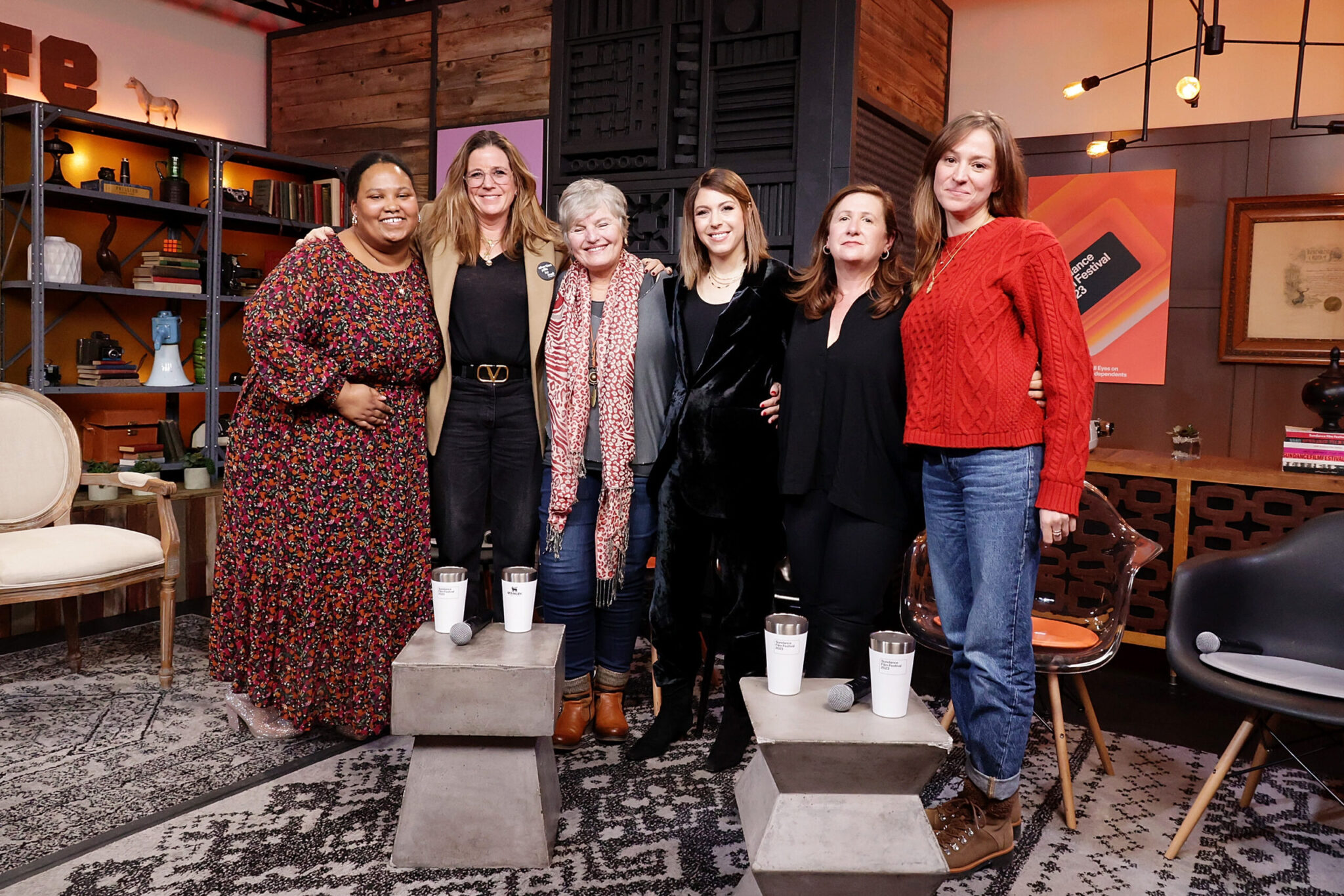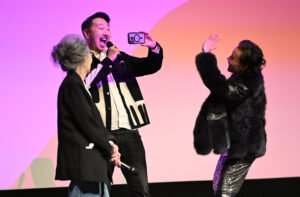PARK CITY, UTAH – JANUARY 22: (L-R) Ashley Finley, Tracy Droz Tragos, Francine Coeytaux, Paula Eiselt, Tia Lessin and Emma Pildes attend the 2023 Sundance Film Festival Cinema Cafe 3 at Filmmaker Lodge on January 22, 2023 in Park City, Utah. (Photo by Momodu Mansaray/Getty Images)
By Katie Small
On the 50th anniversary of Roe v. Wade, filmmakers and reproductive rights activists gathered at Filmmaker Lodge for a community-based discussion on reproductive rights and abortion access in a post-Roe era. Moderator Ashley Finley led a discussion with Tracy Droz Tragos, director of Plan C (premiering Monday, January 23 at the 2023 Sundance Film Festival); Francine Coeytaux, co-founder and co-director of Plan C Pills; Paula Eiselt, director and producer of Aftershock (2022 Sundance Film Festival) and Under G-d (premiering in the shorts program of the 2023 Sundance Film Festival); and Tia Lessin and Emma Pildes, directors of The Janes (2022 Sundance Film Festival).
After playing clips from each of the respective films, Finley took a moment to ground the group and check in to see how everyone was feeling, a tactic that she uses in her restorative justice work. The group expressed their feelings of hope (due in part to the recent vote in Kansas to protect abortion rights) and sorrow, given the anniversary of Roe and the current state of reproductive rights at the federal level, especially regarding how this issue disproportionately affects communities of color. But they also said that the response to their films has been positive and has motivated them to continue to fight for reproductive rights.
Each filmmaker described the ‘aha’ moment that got them involved in the reproductive rights movement. Tragos expressed how Brett Kavanaugh’s confirmation to the Supreme Court made her realize that it was only a matter of time before abortion access and Roe v. Wade would be overturned.
Eiselt said it wasn’t so much a moment for her, but a journey: “Abortion rights is part of the larger reproductive justice conversation, which is part of the larger maternal health conversation. Abortion care is the same thing as maternal care and health care,” she explained. “My film Aftershock focuses on the U.S. maternal mortality crisis. We are the most dangerous country in the industrialized world to give birth in, with Black women dying three times more often than white women. When the Dobbs decision came down, that was essentially saying we are going to force people to give birth in the most dangerous country to give birth in — it’s a human rights violation,” Eiselt said. “After Dobbs, a friend called me and said, ‘We have to do something’ — we found out about a rabbi in Florida who is suing for religious freedom in favor of abortion access. And I thought, that’s really hopeful, that’s something we need to look at.” Eiselt’s short film Under G-d explores the fight for abortion rights from a Jewish perspective.
Finley asked filmmakers what they hope the impact of their films will be. All agreed that de-stigmatizing abortion is huge. Shame around abortion keeps people from finding community and keeps the fight for abortion rights from gaining traction. “It’s been such an important tool for the other side, silencing us and keeping us isolated from each other,” Pildes said. “You can’t organize when you don’t communicate. And they accomplish that by making us feel shame around this issue. We need to be willing to say in public, ‘I’ve had an abortion.’ The idea that there’s something wrong with that weighs heavy on us. And that silence really works in the favor of the people who want to [curtail reproductive freedom]. We need to fight the shame factor so that we can get to work.” Pildes said.
The filmmakers all agreed that highlighting joy and hope in the work is crucial to staying in the fight. They expressed their hope for a future in which all humans experience radical bodily autonomy, a future filled with collective healing, and a world without borders, in which we celebrate our differences.








